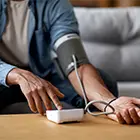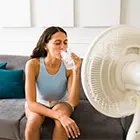Ah, summer! Bring on the sunshine and long, lazy days. If only we could enjoy the sweet rewards of a Canadian summer without the extreme heat that can put your health at risk. Unfortunately, they’re a package deal in many parts of the country.
For people living with a heart condition or risk factors such as high blood pressure, high temperatures can be especially dangerous. And climate change is making them more frequent.
When a heat wave strikes, protect yourself and your loved ones with this advice.
Heat and your heart
In extreme heat, your body works hard to regulate your core temperature through evaporation of sweat. That means circulating more blood to your skin’s surface.
“This puts extra strain on your heart. It has to pump harder in order to get rid of that heat,” says Kelly van Heugten, a registered nurse and manager of the heart program with Heart & Stroke’s health systems team.
“That can result in dehydration, especially with excessive sweating. And it can manifest in symptoms including cramping, exhaustion and heat stroke.”
First priority: Staying cool
Take these steps to prevent heat-related illness.
- Be prepared. Make a habit of checking a local forecast or weather app so you can plan ahead.
- Keep your home cool. Close windows and blinds during hot days; if you don’t have air conditioning (AC), open things up in the evening to catch a breeze.
- Stay hydrated. Drink water throughout the day. “If you wait until you’re feeling thirsty, it may be too late,” says van Heugten. Leaving a glass by the sink can remind you to drink water — always your best choice over sugary drinks and juices. Learn more about healthy hydration.
- Eat lightly. Smaller, frequent meals will be easier to digest. Water content in fruit such as watermelon, peaches and strawberries can help keep you hydrated.
- Avoid peak hours. “We tell our patients to stay out of the sun between 11 a.m. and 3 p.m.,” says pharmacist Riyad Williams of Ayda Pharmacy in Toronto. Seek shade or stay indoors if you can, with a fan or AC. If you don’t have access to AC, consider visiting a public library, mall or community cooling centre. Plan physical activity, including gardening and walks, for morning or evening hours.
- Dress for the heat. “Light coloured and loose-fitting clothes can help keep you comfortable,” says van Heugten.
- Guard against sun. Wear a hat and sunglasses (with both UVA and UVB protection) when outside. Protect your arms with light long sleeves and apply sunscreen often to exposed skin.
- Find ways to cool off. A damp cloth or spray bottle can assist in cooling your skin. Or try a lukewarm shower. Avoid cold showers, which can constrict your blood vessels and slow heat loss.
- Monitor your health. Heat-related symptoms such as dizziness and headache can sneak up on you. Stay ahead of them by taking frequent breaks from activity and staying hydrated.
Danger signs to watch for
Extreme heat can quickly leave you dehydrated, especially during physical activity. Signs include strong thirst and lack of urination, dark yellow urine, fatigue, dizziness or confusion. Rest and drink water to replenish your fluids.
Heat exhaustion and heat stroke are more serious conditions. Be alert for these signs in yourself and others.
Despite its name, heat stroke is not related to stroke.
Heat exhaustion needs speedy attention. “This mainly results from loss of water through excessive sweating,” van Heugten says. Get out of the heat and take steps to cool off quickly and rehydrate. Symptoms include:
- heavy sweating
- weakness
- dizziness
- nausea
- headache
- rapid breathing and heartbeat
- extreme thirst (dry mouth or sticky saliva)
- decreased urination (it may be dark yellow)
Heat stroke is a medical emergency. “It means the body's temperature regulation has failed,” says van Heugten. Call 9-1-1 or your local emergency number right away if you or someone with you experiences these symptoms in extreme heat:
- skin is hot and dry, not sweaty, and may be red
- confusion and agitation, or fatigue
- dizziness or fainting
- rapid heart rate
- nausea, vomiting, diarrhea
- headache
Move the person to a cool area while waiting for help. Drench the skin with cool water and fan it to reduce heat. Ice bags can help; position them at the groin or armpit.
Note: Despite its name, heat stroke is not related to stroke, a medical event where blood stops flowing to part of your brain.
Medication alert
Pharmacist Riyad Williams says hot weather can affect the way some medications work. Here is his advice on four types often prescribed for people with heart conditions or high blood pressure. Ask your pharmacist or doctor for specifics on your prescriptions.
How heat affects common heart medications

If you take a diuretic
“These get rid of excess fluid. So you need to monitor for signs of dehydration and make sure you maintain adequate fluid intake throughout the day.” Learn about diuretics

If you take an ACE inhibitor
“These medications can reduce thirst sensation and raise the risk of low blood pressure. Patients should stay hydrated. Get up slowly from sitting or lying to avoid dizziness or lightheadedness.” Learn about ACE inhibitors

If you take a calcium channel blocker
“These relax arteries and may cause low blood pressure in extreme heat. So, it’s crucial to stay hydrated. Use a blood pressure monitor regularly to ensure it doesn’t get too low.” Learn about calcium channel blockers

If you take a beta blocker
“Beta blockers can decrease your heart rate and limit your body’s ability to cool down. We advise those patients to avoid high temperatures and to be vigilant for signs of overheating.” Learn about beta blockers
Where to learn more
- Health Canada advice and links on extreme heat events
- Cross-Canada weather information from Environment Canada
- More details on heat-related illnesses

